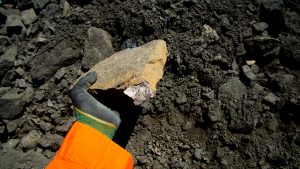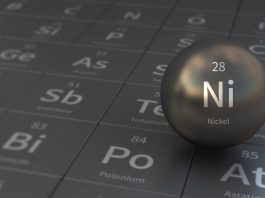Innovation News Network takes a look at the role of nickel within the renewable energy revolution and explores how the industry is working to mitigate its environmental impact.
As the global society makes strides towards a more sustainable future, certain industries and their components have been thrust to the forefront of these efforts.
The metals industry, with a particular emphasis on nickel, plays an essential role in supporting this progression. This is primarily due to its extensive utilisation of renewable energy technologies and battery production.
These technologies are key elements in implementing clean energy solutions such as geothermal power, electric vehicles (EVs), and nuclear energy, among others.
Notwithstanding its inherently energy-intensive production process, nickel’s recyclability makes it instrumental in fostering a circular economy where resources are used optimally, and waste generation is minimised.
Furthermore, it has been noted that using nickel actually results in a net decrease in greenhouse gas emissions – a paramount factor considering the ongoing climate crisis.
Many companies have acknowledged this reality by taking significant steps toward reducing their carbon footprints while simultaneously ensuring that their operations remain sustainable. Apart from implementing technical measures for sustainability enhancement, these organisations also actively promote responsible sourcing techniques within the industry.
This article will explore the crucial role that nickel plays within the renewable energy revolution while examining how its industry is working assiduously to mitigate environmental impact.
Nickel’s importance in the renewable energy revolution
Given its pivotal role in the renewable energy revolution, nickel is not merely a metal but an indispensable catalyst in clean technologies, bolstering the deployment of various sustainable solutions such as geothermal power, hydrogen systems, and advanced battery storage.
Its diverse applications span across multiple sectors, providing vital components that ensure the efficiency and longevity of green technologies.
The unique properties of nickel contribute to its high demand; notably, it enhances corrosion resistance in critical infrastructures like geothermal plants and hydroelectric facilities where durability against natural elements is paramount.
Energy storage stands as one of the foremost areas where nickel asserts its importance. Advanced battery technologies such as lithium-ion batteries utilise major cathode materials composed predominantly of nickel. This allows for higher energy density, improved longevity, and better overall performance – essential factors that underpin the feasibility and viability of electric vehicles (EVs) and large-scale renewable energy storage systems.
Ensuring a stable supply chain for this crucial component thus becomes imperative to maintaining progress in these key areas.
Simultaneously, embracing principles of circular economy has led to innovative methods for nickel sourcing that aim to reduce environmental impacts.
Nickel’s high recyclability means it can be repurposed from used batteries into other applications like stainless steel production without compromising quality or functionality. This capability maximises resource utilisation while minimising waste generation attributing towards lessening carbon footprints associated with initial production.
Moreover, recycling practices along with advancements in life cycle assessment data are aiding efforts to reduce the carbon footprint within the nickel industry.
Many companies and institutions have demonstrated commitment towards sustainability by actively working on reducing CO2 emissions through improvements in operational efficiency and the promotion of responsible sourcing programmes.
It is clear then that nickel serves not only as a material enabler for renewable energy technologies but also as a symbol representing proactive steps being taken by industries toward sustainable development goals.
Emissions from nickel production
The process of manufacturing this crucial metal, despite being energy-intensive and contributing to greenhouse gas emissions, is deemed necessary due to its indispensability in advancing clean technologies and achieving a low carbon economy.

The primary production of nickel involves the extraction and processing of nickel ore which requires large amounts of power. This energy intensity contributes significantly to the carbon footprint of nickel production.
However, it is important to note that the reduction in greenhouse gases achieved by using products made from nickel far outweighs the emissions produced during its manufacture.
Despite these challenges, significant strides have been made towards emission reduction within the industry itself.
The Nickel Institute reports that member companies have reduced their CO2 emissions by nearly 9% since 1999, demonstrating that conscious efforts are being undertaken to mitigate environmental impact whilst ensuring the availability of this critical resource for green technologies.
Furthermore, life cycle assessment data has been instrumental in helping reduce overall environmental impact by identifying areas for improvement and measuring progress over time.
Nickel recycling provides an additional avenue for reducing both energy intensity and resultant greenhouse gases associated with new material extraction. It has been estimated that utilising recycled nickel can cut down on CO2 emissions by as much as 40%, compared to virgin material production processes.
Beyond this direct environmental benefit, recycling also facilitates greater circularity within the economy while simultaneously ensuring a steady supply chain for industries reliant on this metal such as battery manufacturing and stainless steel production – the two biggest consumers of nickel worldwide.
Ensuring sustainability with recycling initiatives
Efforts to enhance circularity within the metals industry have been amplified, with recycling initiatives being prioritised as a key strategy for reducing carbon emissions and ensuring sustainability.
For instance, companies are now focusing on recovering nickel from spent batteries, thus not only decreasing the demand for virgin material extraction but also significantly reducing their associated environmental footprint. This shift towards a more circular economy is part of an industry-wide drive to promote sustainable practices in metal production and use.

The importance of recycling nickel cannot be overstated considering its critical role in the renewable energy revolution and stainless steel production. The process of recovering this valuable metal from recycled batteries allows it to be reused in new battery manufacturing or redirected into other industrial applications such as stainless steel production.
Proponents assert that reusing nickel contributes significantly to minimising the global carbon footprint by circumventing energy-intensive initial production processes.
Stainless steel industries stand to benefit immensely from these recycling initiatives. By incorporating nickel reclaimed from spent batteries into their manufacturing processes, these industries can achieve significant reductions in greenhouse gas emissions compared to traditional methods that rely heavily on virgin materials.
Moreover, using recycled nickel enhances the durability and corrosion resistance properties of stainless steel products thereby promoting longevity and further contributing towards sustainability.
The emphasis on recycling demonstrates a growing commitment among Nickel Institute member companies toward environmental responsibility. Through these efforts, they aim to strike a balance between meeting the increased demand for nickel necessitated by the green energy transition and mitigating associated environmental impacts resulting from its extraction and processing activities.
Thus, the integration of recycling strategies into business operations signifies an important step towards achieving broader goals encompassing both supply chain sustainability and CO2 reduction targets.
Industry’s carbon reduction efforts
Accelerating the transition to a low-carbon economy, members of the Nickel Institute have committed to ambitious goals aimed at reducing their carbon footprint. These commitments reflect an industry-wide recognition of the central role nickel plays in clean energy technologies and the corresponding responsibility to minimise environmental impact throughout its lifecycle.
The member companies have implemented a wide range of measures that encompass energy efficiency initiatives, pollution reduction strategies, waste management practices, and increased use of recycled metals.
Energy efficiency initiatives are a key focus area for the Nickel Institute’s member companies. They are investing in cutting-edge technology and innovative practices that reduce energy consumption during production processes.
For instance, improving furnace designs and heat recovery systems can significantly increase overall process efficiency by reducing both fuel consumption and greenhouse gas emissions.
Additionally, more efficient mining equipment and processing techniques can lead to substantial reductions in energy use.
Complementing these efforts are robust pollution reduction strategies and waste management practices.
Member companies aim to limit emissions not only through efficient operations but also via proactive monitoring and mitigation systems for air, water, and soil pollution.
Waste generated during nickel production is managed responsibly with efforts made towards reuse or recycling wherever feasible; this helps curb resource depletion while also limiting potential environmental harm.
Incorporation of social governance considerations into operational decisions further rounds off these sustainability efforts; respecting human rights, ensuring worker safety, and engaging local communities transparently. These all contribute towards achieving sustainable development goals alongside climate targets.
Utilising recycled metal is another practice being widely adopted by Nickel Institute members as it presents significant opportunities for reducing their carbon footprint compared to initial production from ores – this approach aligns well with circular economy principles which prioritise resource efficiency above all else.
The importance of life cycle assessment data
Understanding the environmental impact of nickel production in its entirety requires a comprehensive life cycle assessment, which is instrumental in identifying opportunities to further reduce the carbon footprint.
This approach includes an environmental impact assessment that measures variables like water usage, air pollution, and waste generation throughout the entire lifetime of a product – from extraction through production, use, and ultimately disposal or recycling.
From a resource efficiency standpoint, this tool helps industries identify areas where improvements can be made to minimise their overall environmental footprints.
Carbon footprint analysis forms an integral part of this life cycle assessment as it quantifies greenhouse gas emissions associated with each stage of nickel’s production process. It provides valuable insights into energy consumption patterns and potential avenues for emission reductions.
With the Nickel Institute member companies having already achieved a 9% reduction in CO2 emissions since 1999, such data-driven analysis enables them to set more ambitious targets towards sustainability.
A sustainability assessment goes beyond just evaluating ecological impacts; it incorporates social and economic considerations as well. The mining industry has long faced criticism for its perceived neglect of these aspects.
However, by taking a circular economy perspective – promoting recycling over disposal – nickel producers have begun to address some of these concerns while simultaneously reducing their sector’s carbon footprint.
Such assessments are crucial not just for accountability but also for guiding future strategies aimed at limiting environmental damage while ensuring resource availability. The use of recycled metals reduces greenhouse gas emissions compared to primary metal production and contributes significantly towards achieving net zero-carbon targets.
As such, life cycle assessments provide indispensable frameworks for sustainable practices within the industry and reinforce nickel’s critical role in supporting the renewable energy revolution.
Responsible sourcing programmes
As part of their commitment to sustainability, Nickel Institute member companies have adopted responsible sourcing programmes that prioritise ethical and environmentally conscious practices in the procurement of raw materials. These initiatives aim to ensure that the nickel supply chain is traceable, transparent, and adheres to stringent environmental standards.
The ultimate objective is not only to reduce the carbon footprint associated with nickel production but also to prevent any negative social or ecological impacts related to unethical mining practices.

The implementation of these responsible sourcing programmes involves rigorous auditing processes across all stages of the supply chain. This includes verifying that mining operations conform to best practices for worker safety, respecting the rights of local communities, and minimising environmental degradation.
Furthermore, these audits establish a system of traceability that allows companies to ascertain the origin of their nickel supplies and guarantee they are ethically sourced.
Transparency plays a pivotal role in ensuring accountability within these programmes. By openly sharing information about their sourcing policies and procedures, Nickel Institute member companies foster trust among stakeholders including consumers, regulators, investors, and local communities.
This transparency also provides an opportunity for continuous improvement as it facilitates benchmarking against industry standards and the identification of areas where further action may be needed.
These robust responsible sourcing programmes signal a clear commitment from Nickel Institute members toward sustainable progress. They not only contribute significantly towards reducing harmful environmental impact but also underscore a broader responsibility towards ethical conduct throughout the nickel supply chain management process.
Through these efforts, the industry aims not just to support the renewable energy revolution by providing essential material resources but also to do so in a manner that respects both people and the planet.
Addressing nickel’s environmental impact
Transitioning from the focus on responsible sourcing programmes in the nickel industry, it is crucial to address the environmental impact of this essential sector. This encompasses not only mitigation strategies but also proactive measures towards a greener and more sustainable future.
Environmental mitigation plays an integral role in managing the impact of nickel production on our planet’s ecosystems. The industry has made significant strides in harnessing eco-friendly solutions that minimise emissions and reduce waste, contributing to global efforts against climate change.
Many companies in the nickel industry have adopted sustainable practices such as improving energy efficiency and increasing the use of recycled metals.
For instance, Queensland Pacific Metals is focused on sustainable nickel production through its 100% owned Townsville Energy Chemicals Hub (TECH) Project.
These initiatives help reduce greenhouse gas emissions associated with nickel production, which accounted for 0.27% of global emissions in 2019.
Moreover, there is a growing emphasis on sustainable practices within the sector. Recognising its pivotal role in supporting a low-carbon economy, green manufacturing principles are being increasingly integrated into operations across the value chain – from mining and smelting to refining and recycling processes.
This shift towards sustainability is not only environmentally conscious but also economically prudent as it fosters resilience against volatile market conditions while enhancing overall industry competitiveness.
Finally, climate change adaptation constitutes another critical aspect of this discussion around environmental impact management within the nickel industry.
As weather patterns become more unpredictable due to global warming, it is vital for mining operations to adapt their practices accordingly so they can continue operating effectively without exacerbating existing environmental challenges.
By opting for adaptive strategies such as water-efficient technologies or measures that protect biodiversity around mining sites, these industries can contribute positively toward minimising their ecological footprint while ensuring a steady supply of this indispensable metal crucial for the renewable energy revolution.










